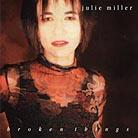November 1999
All of which makes artists like Julie Miller a pleasure to listen to. Her new album, Broken Things, is a mixture of competing and complex emotional concerns sung with conviction and covering a range of musical styles. Co-produced with husband Buddy Miller, and joined in by many Austin-Nashville regulars like Steve Earle, Emmylou Harris, and Victoria Williams, Broken Things takes on the good and bad of life and love. Miller’s songs, all of which she wrote except for the Civil War ballad "Two Soldiers," are direct, her metaphors (rain, wind, fire) simple for the most part. They grab the hand and heart, but not the jugular. Miller addresses contradictory romantic themes throughout the record. In "Ride the Wind to Me," the first song on the album, she sings of the emotional resurrection awaiting her lover, while on "I Know Why the River Runs," the second song, she laments his lack of interest. "I Need You" is a warm plea for someone to be "here with me in my head," but "I Still Cry" and "Out in the Rain," with their images of falling leaves and "rain just coming down now wild and uncontrolled" convey the sadness of when that person isn’t there or, worse yet, has left. Still, she does not attempt to reconcile these aspects of love, but rather notes on the concluding track, "The Speed of Light," that "time and space are relative…the only thing that doesn’t change/makes everything change/is the speed of light/your love for me must be the speed of light." Love as relativity, both mysteries to the human mind. Miller is consistent, however, regarding her faith. Both "Orphan Train" and "All My Tears" show absolute conviction in the Big Man without preaching or proselytizing, and when she sings in "Broken Things" that "you can have my heart/if you don’t mind broken things," she seems to have more than secular concerns in mind. Musically, the record is a sturdy exercise in the folk/rock/blues/country of Austin and the more progressive elements of Nashville. The musicians, led by Buddy Miller on guitar and a number of other instruments, are professional and tight without being slick. Then there’s Miller’s voice. As a general rule, she sounds like Sam Phillips after smoking a pack of Pall Malls. But the roughness and thinness of her voice are what make it endearing; her constant struggle to keep her scratchy voice on key and in tune (which she always wins) conveys a sense of genuineness that singers with better sets of pipes usually ignore or take for granted. She is also a good enough vocalist to sound sweet and ethereal one moment and dark and unbalanced the next. These vocal contrasts highlight the contradictory nature of her songs. The recording quality is somewhat uneven, which is not surprising because at least four different people beside Julie and Buddy Miller were responsible for "additional recording." The guitars chime and the drums whack crisply on most songs, yet on a few, the entire mix sounds as if it is buried in mud. Still, Julie Miller’s voice and lyrics are front and center on every song, where they belong. GO BACK TO: |
 Julie Miller - Broken
Things
Julie Miller - Broken
Things![[Reviewed on CD]](../format/regcd.gif) To the
extent it even deals with real emotion, contemporary music usually sticks with what’s
raw: angst, lust, and hate. This is no fluke. Most folks simply don’t have the time
or patience in their hyper-cyber worlds for subtlety, shading, and context. Look at
politics. Where we once had Jefferson and Hamilton, Lincoln and Douglas, in all their
written and oral majesty, we now have sound bites of Al Gore and George W. Bush. Whatever
it is -- politics, food, music, comedy --give it to us short, straight, fast, and loud,
and make sure it’s rude enough to grab the ever-diminishing, much-competed-for
national attention span.
To the
extent it even deals with real emotion, contemporary music usually sticks with what’s
raw: angst, lust, and hate. This is no fluke. Most folks simply don’t have the time
or patience in their hyper-cyber worlds for subtlety, shading, and context. Look at
politics. Where we once had Jefferson and Hamilton, Lincoln and Douglas, in all their
written and oral majesty, we now have sound bites of Al Gore and George W. Bush. Whatever
it is -- politics, food, music, comedy --give it to us short, straight, fast, and loud,
and make sure it’s rude enough to grab the ever-diminishing, much-competed-for
national attention span.